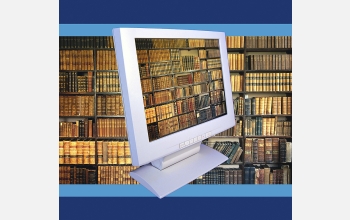News Release 08-003
Digital Library for Geosciences Moves to National Center for Atmospheric Research

The digital library allows scientists, educators and students worldwide to access information.
January 9, 2008
This material is available primarily for archival purposes. Telephone numbers or other contact information may be out of date; please see current contact information at media contacts.
The nation's most extensive collection of digital learning resources for geoscience education is now based at the National Center for Atmospheric Research (NCAR) in Boulder, Colo.
The move ensures that the Digital Library for Earth System Education (DLESE), developed with funding from the National Science Foundation (NSF), will continue to serve hundreds of thousands of K-12 educators and learners around the country.
"DLESE was an early pioneer in NSF's efforts to establish digital science libraries," said Jill Karsten, program director for diversity and education in NSF's Directorate for Geosciences. "Once again, the DLESE program is helping to lead the way in science education by identifying creative new strategies for sustaining library operations, and for keeping these important educational resources available to a global community of educators and students."
DLESE had previously been funded through a five-year grant from NSF. During that grant period (2002-2007), the DLESE archive and program center office were located at the University Corporation for Atmospheric Research (UCAR), which operates NCAR.
The move to NCAR will enable DLESE and its users to benefit from NCAR's extensive cyberinfrastructure and expertise in information management. NCAR library staff will maintain the DLESE collections.
Digital libraries nationwide are exploring ways to maintain continuity in a time of rapid technological change and uncertainties in funding.
"NSF asked that we find some way to preserve open access to the collection," says Karon Kelly, UCAR director of Digital Learning Sciences, a collaborative program with the University of Colorado at Boulder that supports DLESE and other digital learning resources for educational systems.
In determining where to move its collection, DLESE called on a group of experts in information science, geoscience education, and business as well as members of DLESE's former steering committee and advisory board. The group examined potential models of sponsorship and membership and looked carefully at which parts of the DLESE collection should be sustained in the absence of dedicated funding.
"Providing a long-term home for this important resource supports NCAR's educational mission and fits with the NCAR Library's plans to provide increased digital services to the broader scientific and educational community," said Mary Marlino, director of e-Science and the library at NCAR.
-NSF-
Media Contacts
Cheryl Dybas, NSF, (703) 292-7734, email: cdybas@nsf.gov
David Hosansky, NCAR, (303) 497-8611, email: hosansky@ucar.edu
Related Websites
DLESE: http://www.dlese.org
NSF Directorate for Geosciences: http://www.nsf.gov/dir/index.jsp?org=GEO
The U.S. National Science Foundation propels the nation forward by advancing fundamental research in all fields of science and engineering. NSF supports research and people by providing facilities, instruments and funding to support their ingenuity and sustain the U.S. as a global leader in research and innovation. With a fiscal year 2023 budget of $9.5 billion, NSF funds reach all 50 states through grants to nearly 2,000 colleges, universities and institutions. Each year, NSF receives more than 40,000 competitive proposals and makes about 11,000 new awards. Those awards include support for cooperative research with industry, Arctic and Antarctic research and operations, and U.S. participation in international scientific efforts.
Connect with us online
NSF website: nsf.gov
NSF News: nsf.gov/news
For News Media: nsf.gov/news/newsroom
Statistics: nsf.gov/statistics/
Awards database: nsf.gov/awardsearch/
Follow us on social
Twitter: twitter.com/NSF
Facebook: facebook.com/US.NSF
Instagram: instagram.com/nsfgov


